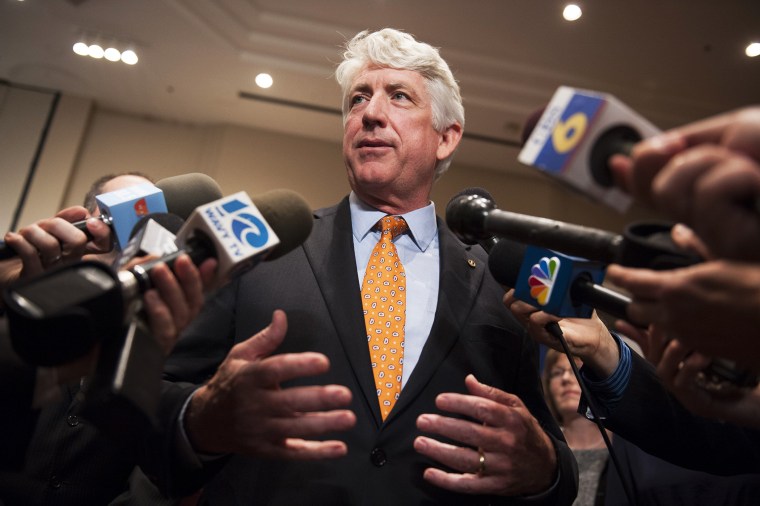A handful of provisional ballots in Fairfax County could determine who becomes Virginia's next attorney general, a race that has come down to an electron-thin margin of votes.
"We've never had an election in the country with more than two million voters where the margin has come down to less than a hundred votes," says Dave Wasserman, U.S. House editor of the nonpartisan Cook Political Report. "It's very rare that provisionals have any chance to influence the outcome of a race."
There are currently only 17 votes separating Republican Mark Obenshain from Democrat Mark Herring, according to the Virginia state board of elections. Obenshain's lead could easily be overtaken by the nearly 500 outstanding provisional ballots remaining in Fairfax County, a Democratic stronghold, provided those ballots are actually counted. A last minute conflict over the rules for counting provisional ballots in the state could determine who becomes the next attorney general for the state--a position used by Virginia Gov. Bob McDonnell as a launching pad for his successful gubernatorial campaign and by current Attorney General Ken Cuccinelli as a bully pulpit for conservative causes.
Although there have been plenty of recent examples of Republican efforts to suppress legitimate voters, the story in Fairfax appears to be simple confusion over what the law requires, particularly in the aftermath of the Supreme Court's decision in Bush v. Gore. That decision blocked the 2000 presidential election recount in Florida, handing the state's electoral votes and ultimately the presidency to George W. Bush. (Post election studies have said it was likely Bush still would have prevailed if the recount had continued).
Provisional ballots were established as part of the 2002 Help America Vote Act, meant to streamline rules for American elections and ensure that the situations like the 2000 election rules fiasco in Florida was never repeated. If a voter shows up and for some reason their eligibility is in question, they are allowed to cast a provisional ballot, the validity of which is determined later. Since then, millions of voters who might otherwise have simply been turned away have been able to vote.
But provisional ballots rarely determine the outcome of a race this large. The more of them get counted, the more likely it is that Herring, the Democrat, overtakes his Republican opponent.
"Fairfax County gave mark herring about 61% of the vote on election day, and an even higher portion of its absentees voted for Herring," says Wasserman. At the same time, he cautions that "there's no guarantee that the provisionals will track with how the election day votes have performed."
On Sunday, the Republican-controlled Virginia State Board of Elections stated, over the objections of the local county election board, that Fairfax County had to adhere to rules determining how provisional ballots are meant to be counted in the state. Previously in Fairfax County, attorneys or represenatives for voters were allowed to argue that those provisional ballots be counted--the statement from the state board makes it clear that said representatives can't do so on their own, without the voter present.
Whether that was a rule change or a clarification of existing rules is disputed, but what it means is that in some cases voters will have to show up to the Fairfax County Election Board in order to have their votes counted, and that attorneys or representatives cannot argue for ballots being counted in the voter's stead. That makes it likely that more provisional ballots will be disqualified--and perhaps more likely that the Republican candidate prevails. According to Wasserman, both sides campaign workers have been going door to door soliciting voters who case provisional ballots to show up at the Fairfax County Board of Elections to ensure their votes get counted.
"The state board is defending its decision on grounds that it needs to assure uniformity in the counting of votes across Virginia jurisdictions," says Rick Hasen, an election law expert and law professor at UC-Irvine. "Some read Bush v. Gore as requiring such uniformity, but there is some dispute as to what exactly, if anything, that controversial case requires."
Whether or not the Virginia board of elections is actually changing the rules or merely "clarifying" them is also of legal consequence, because Bush v. Gore and related cases may also have made it unconstitutional to alter election rules after the election day, depending on the circumstances. "That concept, don't change the rules for counting votes after election day, has surfaced as an important principle since that decision," says Edward Foley, a professor at Moritz College of Law. "If you have the sense that officials are manipulating rules after the ballots have been counted in order to favor one side, that seems fishy."
There's little evidence so far that partisan considerations are the reason for the dispute over how Fairfax County's provisional ballots are counted, but a recount, not to mention litigation, seems likely no matter which candidate prevails.
Nothing like a close race to remind you how much every vote counts--that is, if it gets counted.
